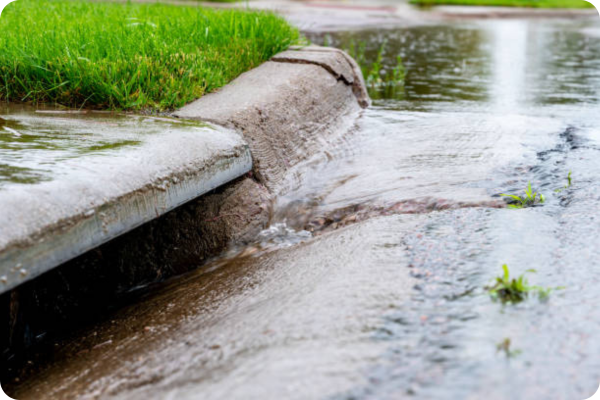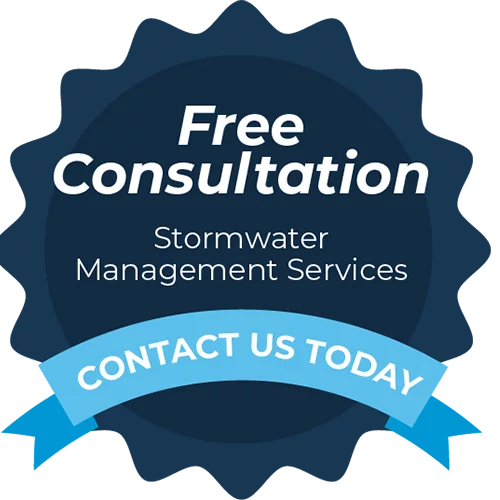Stormwater runoff isn’t just a nuisance – it’s a major threat to water quality, public health, and local ecosystems. As rain falls or snow melts, it flows over impervious surfaces like rooftops, roads, and parking lots, collecting a mix of harmful pollutants. These contaminants are then carried into nearby streams, rivers, and lakes, degrading water quality and harming aquatic life.
At iSTORMWATER, we help commercial property owners, developers, and municipalities across Maryland, Virginia, Washington, DC, and Delaware manage stormwater runoff responsibly and cost-effectively.

What Is Stormwater Runoff?
Stormwater runoff is water from precipitation – rain or melting snow – that doesn’t soak into the ground. Instead, it flows across hard, non-porous surfaces such as asphalt, concrete, and compacted soil. As it flows, it picks up pollutants like:
- Motor oil and grease
- Heavy metals
- Sediment and debris
- Fertilizers and pesticides
- Pet waste and litter
- De-icing salts
This polluted runoff eventually enters storm drains, which often lead directly to local water bodies without treatment. Unlike sanitary sewer systems, stormwater systems typically don’t filter or treat water before discharge, making proactive management essential.
How Stormwater Runoff Degrades Water Quality
When runoff enters waterways, it introduces contaminants that:
- Reduce oxygen levels, harming fish and aquatic organisms
- Disrupt plant growth by increasing turbidity and altering nutrient levels
- Spread bacteria and toxins that pose health risks to humans and wildlife
- Increase flooding and erosion, damaging stream banks and habitats
Stormwater pollution is one of the leading causes of water quality impairment in urban and suburban areas. It’s also a key compliance concern under the Clean Water Act, particularly for commercial property owners subject to MS4 (Municipal Separate Storm Sewer System) permits and other state-level stormwater regulations.
5 Common Pollutants Found in Stormwater Runoff
Here are some of the most common and harmful pollutants that runoff can carry into your local water supply:
- Sediment
Sediment clogs waterways, smothers aquatic habitats, and transports toxins. It can increase water temperature and reduce clarity, impacting aquatic plant photosynthesis and fish feeding behavior. - Oil and Grease
These hydrocarbons form a slick on the water’s surface, cutting off oxygen exchange and stifling aquatic life. Even small amounts can disrupt ecosystems. - Pesticides and Fertilizers
Excess nutrients from fertilizers fuel algal blooms, which can create dead zones by depleting oxygen. Pesticides are toxic to aquatic organisms and may bioaccumulate in the food chain. - Road Salts
Used for de-icing, salts (primarily sodium chloride) raise salinity in freshwater systems. This can kill fish, amphibians, and beneficial aquatic insects. - Heavy Metals
Runoff can contain lead, copper, arsenic, and cadmium from vehicle wear, industrial sources, and construction sites. These metals are toxic to both aquatic life and humans.
Why Stormwater Management Matters
Effective stormwater management is essential to preserve the purity of our region’s waterways. By implementing and maintaining appropriate infrastructure, businesses can:
- Comply with local, state, and federal regulations
- Avoid costly fines and enforcement actions
- Reduce liability from flooding and water damage
- Protect natural ecosystems and biodiversity
- Demonstrate environmental stewardship to the community
At iSTORMWATER, we deliver turnkey stormwater solutions tailored to your property’s specific risks and regulatory needs.
Solutions for Preventing Stormwater Pollution
✅ Aboveground Stormwater Facilities
These structures manage runoff on the surface and include:
- Stormwater management ponds
- Bioretention facilities
- Infiltration basins
- Sand filters
- Extended detention basins
✅ Belowground Stormwater Facilities
Installed beneath parking lots or landscapes, these include:
- StormFilters
- Underground detention vaults
- Aqua-Swirl™ treatment systems
- BaySaver® separation systems
✅ Routine Stormwater Maintenance
Regular maintenance ensures your systems function correctly and stay compliant. This includes:
- Inspections
- Repairs
- Debris removal
- Vegetation control
- Performance assessments
✅ Flood Mitigation
More intense storms are becoming the norm. Proactive flood mitigation – such as installing retention basins, swales, or permeable pavers – helps reduce runoff volume and protect your site from property damage.
Our Certifications & Commitment to Compliance
iSTORMWATER is fully certified to deliver stormwater solutions that meet environmental regulations in the mid-Atlantic region. Our team holds:
- Erosion and Sediment Control Certification
- Stormwater Management Inspector Certification
- Stormwater Maintenance Facility Contractor Certification
All work is performed by trained professionals and backed by our commitment to integrity, transparency, and long-term value.
Schedule Your Stormwater Consultation
If your property has outdated or underperforming stormwater infrastructure, now’s the time to act. iSTORMWATER provides free consultations, expert inspections, and tailored recommendations to protect your site and local waterways.
📍 Serving Maryland, Virginia, Washington, DC, and Delaware
📞 Call us at (410) 231-3455 or 💬 Contact us online .
Real Results
iStormwater LLC was an excellent choice. They made the process of the Stormwater pond repairs seamless. They took charge of the project and got the project approved and passing the inspection. We highly recommend them and would use them again.
Incredible stormwater management service. The owner John consulted on a property I manage and ended up saving us thousands of dollars in environmental fees from the government. Now, our property is compliant with the EPA and we have a great partner to keep us maintained on stormwater regulations over time.
So helpful with all of my water issues.
Great communication and leadership and a family friendly atmosphere. Thank you John!
Stormwater outfalls are one of the most overlooked - but critically important - components of a stormwater management system. While they often sit at the...
- Annapolis
- Anne Arundel County
- Baltimore County
- Baltimore
- Bel Air South
- Bethesda
- Bowie
- Cecil County
- Charles County
- Columbia
- Gaithersburg
- Glen Burnie
- Howard County
- Montgomery County
- Pasadena
- Prince George’s County
- Rockville
- Severna Park
- St. Mary’s County



